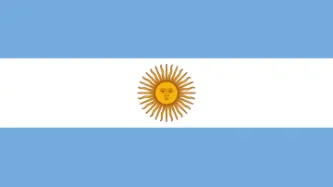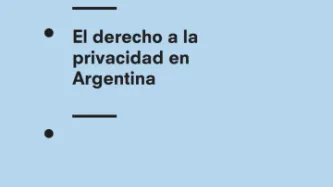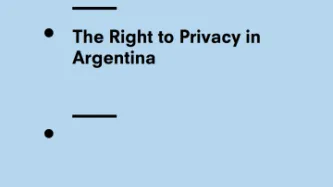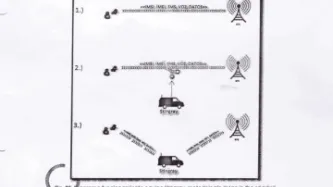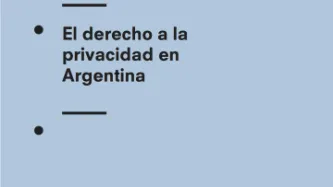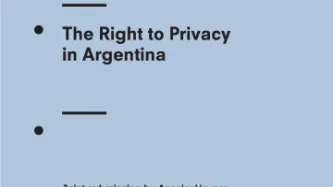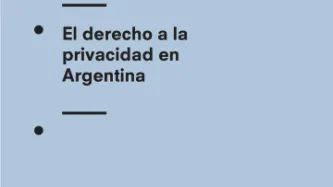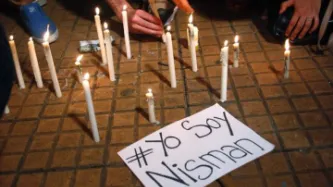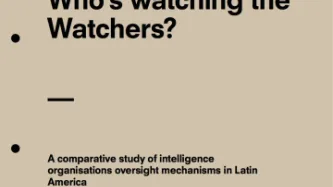Search
Content type: Examples
The Argentinian startup Nippy offers delivery drivers access to rest stops including free coffee, phone charging stations, and toilets in return for downloading its app and allowing it to sell the data the app collects to partners in insurance, financial services, and telecommunications. The result is to give companies like Mastercard and Movistar insight into gig workers' income in the areas where Nippy operates in Argentina, Mexico, and the Dominican Republic. The services Nippy's rest stops…
Content type: Examples
The Argentinian company Urbetrack is developing a "Cuidate en casa" (Take Care of Yourself at Home) app that it will pitch to government agencies throughout the country. The goal is to contribute to remediating the health crisis by helping enforce quarantine. The plan is that users will download the app and complete a form with their personal details as chosen by the local authority. The app will then generate a "radial geofence" defined by the local authority, within which the user must stay.…
Content type: Examples
The Argentinian Ministry of Transport, working with the state-owned satellite company ARSAT and the telecoms regulator,ENACOM, proposed to the Executive on 31 March 2020 a platform that uses cell tower data to track people on public transport and ensure they comply with quarantine laws. By 28 March, the Ministry of Security had detained 13,006 people for violating the rules. The government believes that although compliance is high, it will deteriorate if quarantine is extended much longer…
Content type: Examples
The San Francisco-based big data company Grandata has created a heat map to show which areas of Argentina are best complying with the quarantine lockdown. Grandata used an "anonymised" dataset collected from apps that provide third parties with geolocation information. The heat map shows if an individual has moved more than 100 meters from the place where they spend most of their time, apparently without taking into account the socio-economic contexts of different cities, where individuals…
Content type: Examples
Argentina's Public Prosecutor's Office will start installing an app on the smartphones of those who violate government-ordered quarantine in the cities of Santa Fé and Rosario. The app will be installed by the province's Criminal Investigation Agency to track those who are under criminal investigation for violating quarantine. The app will send reports to the the MPA investigation office and coordinated by the Attorney General's Office. Individuals will be required to sign a document…
Content type: Examples
On March 23, Argentina's immigration agency, Dirección Nacional de Migraciones (DNM), announced that anyone arriving in the country would be required to install the free COVID-19 Ministry of Health app on their phone for 14 days to ensure they comply with quarantine rules in order to protect the population. The Office of the Chief of Staff had instructed the DNM to adopt this policy when it launched the app, also on March 23. Since launch, the number of unnecessary permissions the app requests…
Content type: State of Privacy
Table of contents
Introduction
Right to Privacy
Communication Surveillance
Data Protection
Identification Schemes
Policies and Sectoral Initiatives
Introduction
Acknowledgement
The State of Privacy in Argentina is the result of an ongoing collaboration by Privacy International and Asociación por los Derechos Civiles (ADC).
Key Privacy Facts
1. Constitutional privacy protections: While Argentina's constitution does not mention the word 'privacy', Section 19 has been taken by the…
Content type: News & Analysis
Image attribution: By Blue Diamond Gallery CC BY-SA 3.0.
In March 2017, when the UN Human Rights Council requested the High Commissioner for Human Rights to prepare a report on the right to privacy in the digital age, including the responsibility of business enterprises, Cambridge Analytica was an obscure company among others. A year later the data exploitation scandal erupted, leading to plenty of soul searching by politicians in US, UK, Europe and elsewhere, pledges of…
Content type: Long Read
To celebrate Data Privacy Week, we spent the week discussing privacy and issues related to control, data protection, surveillance, and identity. Join the conversation on Twitter using #dataprivacyweek.
Do you live in a “smart city”? Chances are, you probably do (or at least your city claims to be). But do you know what exactly makes your city “smart”, beyond the marketing term? And what does this have to do with privacy?
Companies and governments will tell you that the more cameras, sensors…
Content type: Advocacy
Este informe es presentado por la Asociación por los Derechos Civiles (ADC) y Privacy International (PI). La Asociación por los Derechos Civiles (ADC) es una organización no gubernamental, sin nes de lucro, ubicada en Buenos Aires, que promueve los derechos civiles y sociales en Argentina y otros países latinoamericanos. Fue fundada en 1995 con el objetivo de fortalecer una cultura jurídica e institucional que garantice los derechos fundamentales de la gente, basado en el respeto a la…
Content type: News & Analysis
This piece was co-written with Valeria Milanes of the Asociación por los Derechos Civiles (ADC). A Spanish version is available here.
In January 2015, the intelligence regime in Argentina was put in the limelight following the death of Prosecutor Alberto Nisman. It was alleged that the intelligence services were involved in his death. This scandal prompted reform of the country’s intelligence system.
In February of the same year, the Intelligence Act (N° 25…
Content type: Advocacy
This stakeholder report is a submission by Asociación por los Derechos Civiles (ADC) and Privacy International (PI). The Asociación por los Derechos Civiles (ADC) is a non-governmental, non-pro t organisation based in Buenos Aires that promotes civil and social rights in Argentina and other Latin American countries. It was founded in 1995 with the purpose of helping to strengthen a legal and institutional culture that guarantees the fundamental rights of the people, based on respect…
Content type: Long Read
The use of IMSI catchers[1] to arrest individuals is rarely documented — as IMSI catchers are used secretively in most countries. The arrest of Colombian drug lord Henry López Londoño in Argentina is therefore a rare opportunity to understand both how IMSI catchers are used, and also the complexity of their extraterritorial use.
In October 2012, Londoño — also known as Mi Sangre (“My Blood”) — was arrested in Argentina. His arrest was the result of cooperation between the Dirección de…
Content type: Press release
This week in Geneva, the UN Human Rights Committee will examine the Argentina’s compliance with the International Covenant on Civil and Political Rights (ICCPR), an international treaty which places obligations on signatories to guarantee human rights such as the right to privacy.
This review, by a body of independent experts charged with monitoring compliance with the ICCPR, comes at a critical time for Argentina laws and policies on privacy and surveillance.
Recent years have seen…
Content type: Press release
Esta semana en Ginebra, el Comité de Derechos Humanos de la ONU examinará el cumplimiento de la Argentina con el Pacto Internacional de Derechos Civiles y Políticos (PIDCP), un tratado internacional que establece obligaciones a los firmantes para garantizar los derechos humanos, como el derecho a la privacidad.
Este examen, por un grupo de expertos independientes encargados de vigilar el cumplimiento del PIDCP, llega en un momento crítico para las leyes y políticas de la Argentina sobre la…
Content type: Advocacy
La Asociación por los Derechos Civiles (ADC) y Privacy International toman nota de las respuestas del gobierno de Argentina a la lista de cuestiones antes de la presentación del informe, en particular en relación a la legislación, políticas y prácticas relacionadas con la vigilancia y la protección de los datos personales.
Privacy International es una organización de derechos humanos que trabaja para favorecer y promover el derecho a la privacidad y la lucha contra la vigilancia en todo el…
Content type: Advocacy
Asociación por los Derechos Civiles (ADC) and Privacy International note the replies by the government of Argentina to the list of issues prior to the submission of the report, in particular in relation to the laws, policies and practices related to surveillance and protection of personal data.
Privacy International is a human rights organisation that works to advance and promote the right to privacy and fight surveillance around the world. The Asociación por los Derechos Civiles (ADC) is a…
Content type: Advocacy
La Asociación por los Derechos Civiles (ADC) y Privacy International toman nota de las respuestas del gobierno de Argentina a la lista de cuestiones antes de la presentación del informe, en particular en relación a la legislación, políticas y prácticas relacionadas con la vigilancia y la protección de los datos personales.
Privacy International es una organización de derechos humanos que trabaja para favorecer y promover el derecho a la privacidad y la lucha contra la vigilancia en todo el…
Content type: News & Analysis
UPDATE: Argentina's President Cristina Fernandez de Kirchner has announced plans to disband Argentina's intelligence agency. Go here for more, and keep reading below.
This post was originally published on 20 January 2015 by Privacy International's partner in Argentina, the Asociación por los Derechos Civiles (ADC). To read the original post, please go here.
In view of the serious incidents that took place on 18 January 2015, the Asociación por los Derechos Civiles (ADC)…
Content type: Report
In societies that are in the process of transition towards democracy, democratic control of intelligence organisations is both an indispensable requirement and a pressing need. In many cases, the most serious human rights violations committed by dictatorial governments were intrinsically linked to draconian surveillance and control systems. Systematic spying on trade unions, students and dissident groups was a common feature of 20th-century dictatorships. The persistent violation of citizens’…
Content type: News & Analysis
Just a few weeks ago, thousands of Argentinians had their privacy rights violated when the country’s electoral registration roll, which had been made available online, experienced a major leak of personal data following the presidential election.
Despite some early warnings on the weaknesses of the system, the government did nothing to fix the situation, allowing serious technical flaws in an online system to persist and refusing to respond to the crisis, further…
